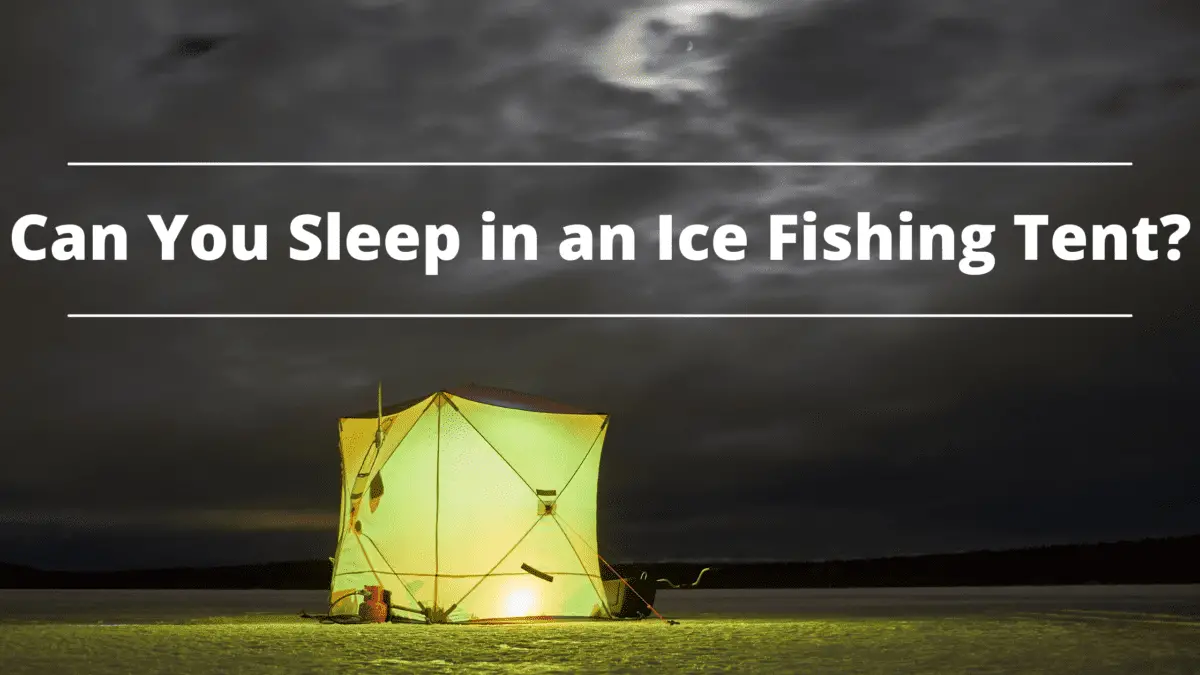Most hubs or pop-up ice fishing tents will allow you to sleep comfortably overnight. However, you always have to make sure that you are safe because of possible CO2 buildup due to the use of heaters. Thus, you will need heaters with an auto-shutoff feature, a CO2 detector, and to make sure that the vents are open.
Having an insulated ice fishing tent that is big enough to accommodate a sleeping bag rated for freezing temperatures will ensure that you have a comfortable night’s sleep on the ice.
Read along to find out more about how to comfortably sleep in an ice fishing tent.
A lot of fishing rods and reels can last a lifetime, handle a wider variety of fish, and can take a beating. Whether you are looking for your very first fishing rod or want to buy a new one, we’re sure that our best fishing rods list holds a lot of options that will help you find the best rod for you.
Factors to Consider When Choosing an Ice Fishing Tent
When it comes to finding an ice fishing tent to sleep in, there are a few factors you have to take into consideration.
Portability
Make sure you’re aware of the weight of the ice fishing tent you are choosing to avoid buying a shelter, building it, and then realizing that you can’t get it to your favorite destination. So, make sure you ask yourself the following questions:
- Will you be taking your tent across the lake yourself or with an ATV?
- Are you setting up the tent alone or with some help?
- Can you handle carrying or dragging the total weight of your gear?
You also have to remember that the weight of the tent adds weight on the ice. Thus, any extra weight can increase the chances of the ice cracking or breaking.
A good tip is to have a good travel cover to keep your gear from accumulating dust or snow, which can add weight to it.
Size
If you plan on fishing with family and friends, you will want a larger-sized ice fishing tent. Most of them are built to sufficiently accommodate two to three people, plus their equipment. This is a common size that is great for individuals too. However, if you plan on sleeping overnight, you may want something even larger to accommodate sleeping bags.
Remember that a shelter designed for six and used by only two people will be colder than it should be. Thus, you have to select the size that’s right for you, your companion, and your equipment, but you don’t want tons of extra space.
With that being said, you will need enough room to set up your sleeping bags and enough height to stand comfortably and work your rod and fight your fish onto the ice. You’ll also need room for your gear and heater, so don’t forget to consider those extras when making your choice.
Heavy Duty Features
Look for heavy-duty features like YKK zippers and a wide bottom design to accommodate your sleeping bags and other equipment. Plus, it will create a larger space for your activity.
A wide bottom design also contributes to the tent’s overall sturdiness. However, you should also take note of how well it can withstand winds, thus making sure it has durable guy lines and ice anchors will help the shelter stay put during harsh weather conditions.
Materials
If you are going to sleep overnight in your ice fishing tent, you will want something that is more heavy-duty than your average shelter.
The cold environment can quickly take its toll on an ice fishing tent that is not designed for harsh conditions, which ice anglers face on a daily basis.
Look for an ice fishing tent that is not only built to handle some severe weather but is also quite large so you and your buddies can all camp inside that one tent, which will save you money and time on buying additional tents and carrying excessive amounts of gear.
The main thing to look for is the Denier number, which will give you an idea of how durable and thick the fabric that makes up the portable ice fishing tent is. A higher number will mean more durability. For instance, a 500 Denier tent can provide more shelter than a 300 Denier shelter.
A heavier, denser material will also provide more warmth but will cost and weigh more. So, if you prefer colder or harsher fishing areas, a heavier tent with strong seams that can withstand the snow and wind might be your best option.
Insulation
The most important factor you should consider when looking for an ice fishing tent is insulation. Insulation on an ice fishing tent works by creating a barrier between you or the warmth and the cold, windy outdoor conditions.
If you want to stay warm inside while sleeping in your ice fishing tent, insulation is key. When comparing which tent is best suited for you, one of the most crucial aspects is to look for the insulation R-value, which is a number represented with R in front of it.
The larger the R-value or number, the more effective the insulation. So, while two tents may be both insulated, this does not necessarily mean that they will keep you warm equally. One may have a very low R-value, while the other might have a moderate to high R-value. The better the quality of the tent, the higher the R-value of the insulation may be, and the longer the warmth will stay inside the tent.
But regardless of the amount of insulation your ice fishing tent has, it may never be enough to maintain a consistently warm temperature as the heat trapped inside the tent will always escape through the much cooler ice, which is why some people prefer to have an ice shelter with an insulated floor to try and minimize the amount of heat energy that is escaping into the coldness beneath them.
Vents, Windows & Doors
Different fishing conditions will tell you how much light gets into your shelter. Thus, you should have a few windows, at least one on each wall, so you can let in natural light. A good shelter will also have inside covers to allow you to block all or some of the light depending on your needs.
You also have to make sure that your shelter has a large enough door for you to get in and out of, and an extra door in case one gets jammed for whatever reason.
Additionally, if you’re using any gas augers inside, which isn’t advisable, opening all the vents is of huge help, especially if you plan on sleeping there overnight.
Ice fishing is an activity that is done near water. Because of this, some may assume that the tent that they’ll be using should be waterproof but this is not always the case. Should ice fishing tents be waterproof? Read our article to learn more.
Sleeping Bag Features
The right sleeping bag can make a big difference and greatly help you have a restful night on the ice, so knowing how to choose the best ones is essential. Here are a few things you should look out for when searching for sleeping bags for your ice fishing tent.
Temperature Rating
Sleeping bags indicate the minimum temperature they are designed to handle. However, temperature rating should not be taken seriously as there is no standard method for determining such ratings, which means manufacturers make their own claims. Although most are realistic, some are just optimistic ratings.
Since you can always unzip a bag if it feels too warm, you should pick a sleeping bag with a lower temperature rating than the lowest nighttime temperature you expect at the location.
If you will use your bag for ice fishing, look at sleeping bags that can handle lower temperatures.
| Sleeping Bag Type | Temperature Rating |
| Winter | 15°F and lower |
| 3-season | 15°F to 30°F |
| Summer | 30°F and higher |
These temperature ratings are based on an “average sleeper” and aim to compare sleeping bags to one another. A wide range of other factors can affect how you’ll really feel once you are out there, like your sleeping pad, what you wear while sleeping, the humidity and wind, your metabolism, and more.
Insulation
Down insulation is the lightest insulation. It is more compressible and retains its loft longer, but is generally more expensive depending on the fill power, which is its quality rating.
Fill power ranges from 600 to 900, and the higher the amount, the warmer you are going to be. Synthetic insulation, on the other hand, comes in a lot of different types. However, it generally is a fluffy polyester that doesn’t absorb water, although it may come bulkier and heavier but is less expensive.
| Insulation Type | Benefits |
| Down Insulation |
|
| Synthetic Insulation |
|
Read our guide here for more in-depth information about sleeping bags that you can use for cold weather conditions.
Frequently Asked Questions
Can you use an ice fishing shelter as a tent?
An ice fishing shelter is typically similar to an expensive 4-season tent. And since ice fishing tents are used in cold weather settings, they can also be good for winter camping.
As long as you have the necessary equipment to make yours as comfortable, then there is no reason for it not to work as a camping tent.
Is fishing in the cold good?
Ice fishing, or cold weather fishing, can be as great as it is in the summer, especially since the weather will keep you cozy next to your heaters or wood burning stoves.
Winter is a particularly great time to fish since freshwater species group up during this season, which means more fish on your lure.
Conclusion
You can definitely sleep in your ice fishing tent. However, you need the right gear to make your stay safe and comfortable. A few gears that you will need are a heater and a sleeping bag.
Remember that there are a few factors you need to consider when choosing an ice fishing tent, as these would help you find the right shelter for your needs. Another thing to note is the quality of your gear or equipment. They should be durable enough to withstand the cold weather elements and protect you from these elements as well. As long as you follow our suggestions, finding a good quality ice fishing tent will be a piece of cake.

